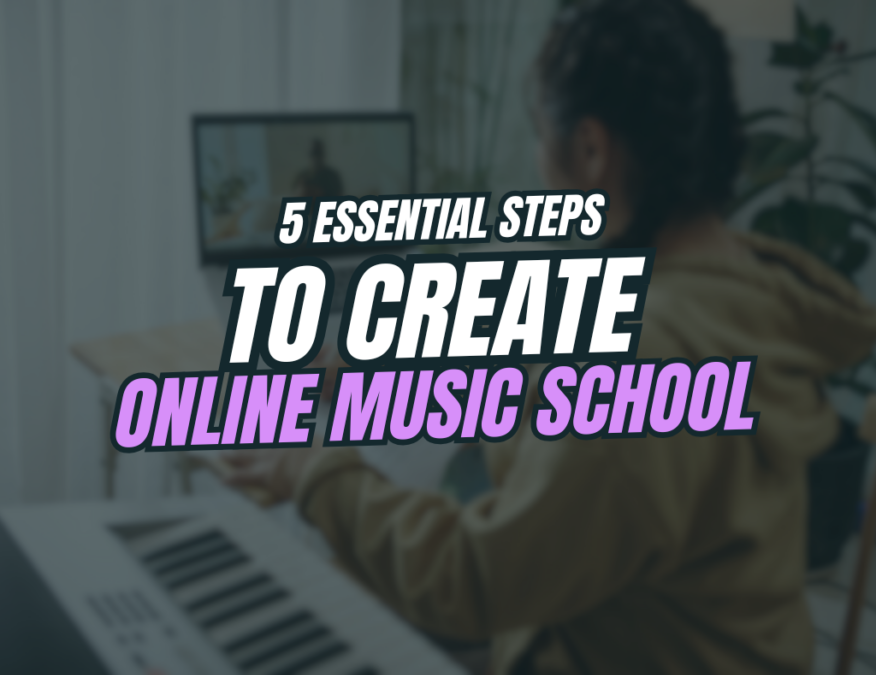Have you ever dreamed of creating your own School of Music Online and sharing your musical passion with students around the world? The digital age has opened up incredible possibilities, allowing music educators to connect with learners from every corner of the globe. By starting a School of Music Online, you not only get to teach what you love but also build a flexible, scalable business that can thrive in today’s online learning environment.
In this guide, we’ll take you through the steps to launch your very own School of Music Online, from setting up the right platform to creating engaging courses that will captivate students and grow your music academy into a successful venture.

The Growing Demand for Schools of Music Online
The demand for schools of music online has surged in recent years, driven by the increasing popularity of online education and the convenience it offers. Here’s why starting a school of music online is a viable and exciting venture:
- Global Reach: A school of music online can attract students from all corners of the world, breaking geographical barriers and expanding your potential market.
- Flexibility: Online learning allows students to take lessons at their own pace and at times that suit their schedules, which is a significant advantage over traditional in-person classes.
- Cost Efficiency: Running a school of music online reduces overhead costs associated with physical locations, such as rent, utilities, and maintenance.
Steps to Create a Successful school of music online
Starting a school of music online involves several key steps. Here’s a detailed breakdown of what you need to do to build a successful virtual music academy.
1. Define Your Vision and Goals
Before diving into the logistics of setting up your school of music online, it’s essential to define your vision and establish clear goals. Consider the following:
- Target Audience: Decide whether your school of music online will cater to beginners, intermediate learners, or advanced musicians. Understanding your audience will help you tailor your courses to their needs.
- Specializations: Determine if you want to offer a broad range of instruments and genres or focus on specific areas such as classical music, jazz, or electronic music.
- Teaching Philosophy: Establish your teaching methods and the unique value proposition of your school. Will you offer personalized instruction, group lessons, or a combination of both?

2. Develop a Comprehensive Curriculum
A well-structured curriculum is crucial for the success of your school of music online. Here’s how to develop a curriculum that engages and educates your students:
- Course Structure: Design detailed modules for each course. Break down the content into manageable lessons, practice exercises, and assessments.
- Instructional Materials: Prepare high-quality materials such as video tutorials, sheet music, practice guides, and supplementary resources. Ensure that these materials are accessible and easy to use.
- Certification: Consider offering certificates or diplomas upon course completion. This adds value to your courses and provides students with a tangible achievement.
3. Choose the Right Technology and Platforms
Selecting the right technology is essential for delivering effective online music lessons. Here’s what you need to consider:
- Learning Management System (LMS): Choose an LMS that supports video content, quizzes, and interactive features. Platforms like Teachable, Thinkific, and Kajabi are popular choices for schools of music online.
- Video Conferencing Tools: Use reliable video conferencing tools like Zoom, Microsoft Teams, or Google Meet for live lessons and student interactions. Ensure that these tools offer good video and audio quality.
- Recording Equipment: Invest in high-quality microphones, cameras, and audio interfaces to create professional and clear lesson recordings. Good equipment ensures that students receive the best possible learning experience.

4. Build a User-Friendly Website
Your website is the digital face of your school of music online. It should be visually appealing, easy to navigate, and informative. Focus on:
- Course Listings: Provide detailed descriptions of each course, including objectives, prerequisites, and pricing. Include sample lessons or previews to attract potential students.
- Registration and Payment: Implement a seamless registration process and integrate secure payment options. Make it easy for students to sign up for courses and make payments online.
- Contact Information: Offer clear contact details and support options. Include a contact form, email address, and phone number for inquiries and support.
5. Create High-Quality Content
Content is the cornerstone of your school of music online. High-quality content helps engage students and enhances their learning experience. Focus on:
- Video Lessons: Produce engaging and well-edited video lessons. Ensure that the videos are clear, concise, and professionally presented. Use visual aids and demonstrations to enhance understanding.
- Practice Exercises: Provide downloadable practice exercises and sheet music to supplement your lessons. Include exercises that cater to different skill levels and musical styles.
- Interactive Features: Incorporate quizzes, assignments, and discussion forums to encourage student interaction and participation. Interactive features help reinforce learning and build a sense of community.

6. Market Your school of music online
Effective marketing is essential for attracting students to your school of music online. Use a variety of strategies to build your brand and reach your target audience:
- Social Media: Promote your courses on social media platforms such as Facebook, Instagram, and YouTube. Share engaging content, such as lesson previews, student testimonials, and behind-the-scenes glimpses of your music school.
- Search Engine Optimization (SEO): Optimize your website and content for search engines to improve visibility. Use relevant keywords related to online music education, specific instruments, and genres.
- Email Marketing: Build an email list and send regular newsletters with updates, promotions, and valuable content. Email marketing helps keep potential and current students informed and engaged.
7. Provide Exceptional Student Support
Offering excellent support is key to retaining students and ensuring a positive learning experience. Focus on:
- Personalized Feedback: Provide individualized feedback on student performances and progress. Personalized feedback helps students improve and stay motivated.
- Technical Support: Offer assistance with any technical issues related to the online platform or course materials. Ensure that students have access to help when they need it.
- Community Engagement: Foster a sense of community among your students through forums, group discussions, and virtual events. Building a supportive community enhances the learning experience and encourages student retention.

8. Continuously Improve and Adapt
To ensure the long-term success of your school of music online, it’s important to continuously improve and adapt. Consider:
- Collecting Feedback: Regularly solicit feedback from students to identify areas for improvement. Use surveys, reviews, and direct feedback to understand student needs and preferences.
- Updating Content: Refresh your course materials and add new content to keep your offerings relevant and engaging. Stay updated with industry trends and incorporate new techniques and resources into your courses.
- Exploring New Technologies: Stay informed about emerging technologies and tools that could enhance your online music school. Innovations in technology can provide new opportunities for improving the learning experience.
Tips for Making Your school of music online Stand Out
To make your school of music online truly exceptional, consider implementing these additional strategies:
1. Offer Unique Courses and Specializations
Differentiate your school of music online by offering unique courses or specializations. Consider:
- Niche Instruments: Provide lessons for less common instruments or genres. Offering specialized courses can attract students with specific interests and needs.
- Advanced Techniques: Include advanced courses that delve into specific aspects of music theory, composition, or performance. Catering to advanced students can set your school apart from competitors.
2. Collaborate with Industry Experts
Partnering with renowned musicians or educators can boost your school’s credibility and attract more students. Consider:
- Guest Instructors: Invite well-known musicians or industry experts to offer workshops or special courses. Their expertise can enhance your course offerings and draw students to your school.
- Collaborations: Collaborate with other music schools or organizations to expand your reach and offer joint programs. Partnerships can provide additional resources and opportunities for your students.
3. Invest in Marketing and Branding
Building a strong brand is essential for the success of your school of music online. Focus on:
- Consistent Branding: Develop a cohesive brand identity, including a logo, color scheme, and messaging. Consistent branding helps create a professional image and increases recognition.
- Content Marketing: Create valuable content such as blog posts, tutorials, and music tips. Content marketing helps establish your expertise and attract potential students.
- Testimonials and Reviews: Showcase positive testimonials and reviews from satisfied students. Social proof can enhance your credibility and influence potential students’ decisions.

Conclusion
Creating a school of music online offers a fantastic opportunity to share your passion for music with a global audience. By following the steps outlined in this guide, you can build a successful virtual music academy that provides exceptional value to students. From defining your vision and developing a comprehensive curriculum to choosing the right technology and marketing your school, each step is crucial for establishing and growing your online music school. Embrace the potential of online education, and take the first step towards launching your own school of music online.
Ready to turn your musical passion into a profitable online business?
EpicSellr makes it easy to create and manage your School of Music Online. With zero platform fees and powerful tools at your fingertips, you can reach students worldwide, build your music academy, and start earning today. Your dream music academy is just a few clicks away with EpicSellr.
Need help or have questions? Contact us today for assistance. For more information, click here.



